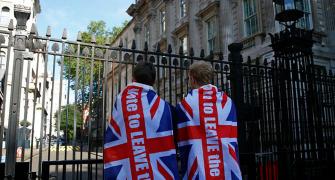‘This is an historic moment from which there can be no turning back,’ said the British PM.

IMAGE: British Prime Minister Theresa May in the cabinet office signs the official letter to European Council President Donald Tusk invoking Article 50 and the United Kingdom's intention to leave the EU on Tuesday in London. Photograph: Christopher Furlong/Pool/Reuters
British Prime Minister Theresa May on Wednesday said there could be “no turning back” as the countdown to Britain’s exit from the European Union began after the British envoy to the economic bloc delivered her letter to the European Council in Brussels, announcing the UK’s intention to end its 44-year association.
In her statement to the House of Commons, May said that Sir Tim Barrow had delivered her letter to Donald Tusk, President of the European Council, in Brussels.
“Today the government acts on the democratic will of the British people and it acts too on the clear and convincing position of this House,” she said.
“The Article 50 process is now under way and in accordance with the wishes of the British People the United Kingdom is leaving the European Union. This is an historic moment from which there can be no turning back,” she said in an address that was frequently interrupted by opposition MPs.
“Now is the time for us to come together, to be united,” she said, a day after Scotland’s parliament voted in favour of an independence referendum.
The formal notification to the other 27 EU members of Britain’s intention to invoke Article 50 of the Lisbon Treaty was signed by May at her 10 Downing Street office on Tuesday night.
Barrow began his meeting with Tusk on Wednesday morning during which he formally handed over the six-page letter to set the clock for a two-year negotiation process for Britain’s relationship with the EU as a non-member.
“After nine months the UK has delivered. #Brexit,” Tusk tweeted on receiving May’s letter. He later told reporters that there was no point pretending that it was a “happy” day and his approach would need to be one of “damage control”.
“Paradoxically, there is also something positive in Brexit. It has made the community of remaining 27 members more determined and united,” he said, adding that the negotiations ahead would be “difficult”.

IMAGE: Anti-Brexit protesters, one wearing a giant Theresa May head, hold placards outside Parliament on the day the PM announced beginning of Brexit. Photograph: Stefan Wermuth/Reuters
In her address, May said Britain would now make its own decisions and its own laws and “take control of the things that matter most to us -- and we are going to take this opportunity to build a stronger, fairer Britain, a country that our children and grandchildren are proud to call home”.
She promised to “represent every person in the whole United Kingdom” during the negotiations -- including EU nationals, whose status after Brexit has yet to be settled.
“It is my fierce determination to get the right deal for every single person in this country. For, as we face the opportunities ahead of us on this momentous journey, our
shared values, interests and ambitions can -- and must -- bring us together,” she said.
In her letter to the European Council, she highlighted that Britain’s decision to leave was not an attempt to do any harm to the European Union.
“Instead, the referendum was a vote to restore, as we see it, our national self-determination. We are leaving the European Union, but we are not leaving Europe -- and we want to remain committed partners and allies to our friends across the continent,” her letter to Tusk reads.
“It is in the best interests of both the UK and the European Union that we should use the forthcoming process to deliver these objectives in a fair and orderly manner, and with as little disruption as possible on each side. We want to make sure that Europe remains strong and prosperous and is capable of projecting its values, leading in the world, and defending itself from security threats,” it adds.
Opposition Labour leader Jeremy Corbyn said his party respected the decision to leave the EU and would hold the government to account “every step of the way”.
The focus will now shift to No.9 Downing Street in London, which houses the Department for Exiting the European Union headed by Brexit minister David Davis.
Following the notification process, the Great Repeal Bill will be published in Parliament on Thursday to cover the political break from the economic bloc.
On Friday, Tusk is expected to publish the European Council’s negotiating guidelines, which will make the course of the so-called “divorce” proceedings for UK’s exit clearer.
The Brexit negotiator on the EU side, Michel Barnier, has said he would like to wrap up the process by September 30, 2018, leaving enough time for it to be ratified by the
European Parliament.
The notification of Article 50 marks the first formal step in the direction of Brexit after a referendum in June 2016 in favour of Britain leaving the EU.
On Tuesday night, the British PM spoke by telephone to Tusk, EU Commission president Jean-Claude Juncker and German Chancellor Angela Merkel to discuss the move.
Article 50 gives both sides two years to reach agreement, so unless both sides agree to extend the deadline for talks, the UK will have left the EU on March 29, 2019. The official negotiations with the EU are to begin by mid-May.
The UK government says it wants to carry out both separation and trade talks at the same time, but EU chiefs say the two issues must be handled separately.
The UK has said it wants an “early agreement” to guarantee the rights of EU citizens living in the UK and those of British nationals living in EU countries.
Other issues which are likely to be discussed are things like cross-border security arrangements, the European Arrest Warrant, moving EU agencies which have their headquarters in the UK and the UK’s contribution to pensions of EU civil servants - part of a wider so-called “divorce bill” which some reports have suggested could run up to 50 billion pounds.









